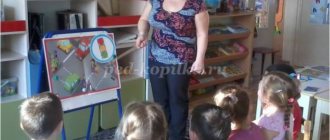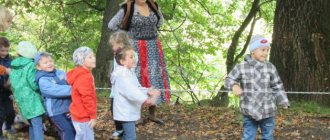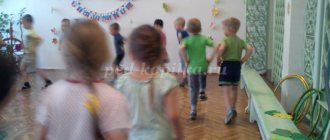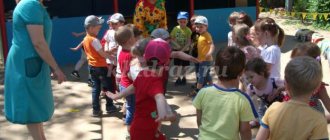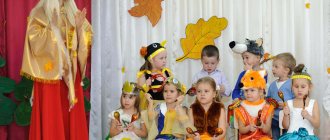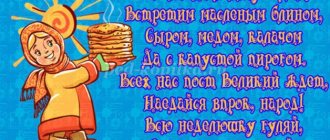Entertainment in a preschool educational institution for children 6-7 years old. “We are the future defenders of the Fatherland.”
Sports festival
"Defenders of the Fatherland"
in the group for 6-7 years.
Conducted by: Rodionova T.P.
Target:
to form in children patriotic qualities, pride and respect for the Russian army.
Tasks:
Educational:
Expand children's horizons through familiarization with military paraphernalia and military professions; activate vocabulary with new adjectives (strong-willed, resourceful, purposeful) Developmental:
Improve coordination of movements, develop dexterity and accuracy in children. Develop children's creativity and performance skills. Educating:
Encourage children, come to the aid of a friend, show support and sympathy.
Equipment (laptop, hoops, balls, skittles, bags, gymnastic sticks, vegetables, fruits). Progress of the event:
The hall is festively decorated.
Children, to the music - “Serve Russia”, enter the hall, performing a ceremonial formation, snake through the center, line up in a semicircle)
Child
Today is the day of our Army, there is no stronger army in the world. Hello defenders of the people! Russian Army... All
.
Hello! (Children read 3-4 poems prepared in advance.) Presenter
. Today we have gathered to celebrate Defender of the Fatherland Day. Probably, there are defenders in every home, in every family - these are grandfathers, older brothers, uncles, and of course your beloved dads!
I would like to wish them health, success in all their endeavors and pride in their children! Our preschool children give everyone present a song: “Brave Soldiers” - “to the right, sing a song!” children walk towards the chairs
,
at the end of the song they sit down. 1 child.
Happy birthday, army!
- says the country. Glorious protector, always be strong! 2child
.
We love our army, it is a great force, fearless in battle, it defeated all its enemies. 3child
.
And we sing songs about her, about valiant campaigns. She preserves our peaceful home, peace and work of peoples. 4child
.
The native army is strong and invincible in battles. She stands indestructibly guarding the Motherland. Child.
Boys dream of growing up quickly, becoming adults, and going to work.
Leading:
And in order to serve with dignity, you need to prepare for this from childhood. After all, a little time will pass, and our boys will grow up and take the place of those who are now guarding our Motherland. And today we will spend this holiday as a war game. All boys and girls, without exception, will participate in it, especially since in our time women also stand guard over the Motherland. So, the military exercises begin!
We will split into two teams,
Our competitions will be judged by a strict but fair jury,
Leading:
Let the jury follow the entire course of the training without a mistake, Whoever turns out to be more friendly will win today!
Teams, greet each other! Host
: So, we begin! First competition –
relay race “The most accurate shooter”.
Shells are flying, the battle is roaring, and it’s not so easy to hit the target! And only the one who really wants it will bring a point to the Team!
Leading
.
We continue our competitions, the next relay race is “Obstacle Course”.
(Climb under the arc, crawl along the bench, run around the stumps).
Leading
.
"Boat sailing" Each team member takes turns sitting in the basin and, pushing off with his arms and legs, “swims” to the “buoy” and then returns back.
Leading:
A fighter needs not only fast legs and a clear head, but also strength!
Let's have a strongman competition.
(Tug of war)
Leading:
Now for a little rest! I suggest you remember what military professions you know!
(Riddles about military professions) The last riddle: They never sleep, At their native border, Our sea, our land, They guard our sky. (border guards)
Leading
: To learn even better about the everyday life of border guards, Let's take a closer look at their service..
Game “Border Guards and Violators”
One team stands in a circle, holding hands.
The border is open for the team: Raise your hands, the second team marches to the music in and out of the circle. On the command “Watch”, lower your hands, those remaining in the circle are considered detained and are sent to the commandant’s office, that is, to the chairs. The soldier must be able to move carefully, but at the same time very quickly
in the trench, our guys will now show us how they can do it.
Relay: “Quickly into the trench.”
As the saying goes:
“War is war, but lunch is on schedule.”
Relay race: “Field kitchen”.
One team cooks borscht, and the other compote.
Well, the hostilities are coming to an end and our soldiers are ready to return home.
Relay race: “Fast armored train.”
The whole team needs to run like a train between the pins and return to their place.
The roles of locomotives will be performed by dads. Leading
: Well done! The children turned out to be worthy of praise and congratulations. It remains to wish that you always remain as cheerful and friendly! And now a declaration of love to our dads!
CHILDREN READ POEMS FOR DADS ON VIDEO.
“OUR ARMY” STEPANOV V., BORDER GUARD ZHAROV A.
Leading:
Well, now, it’s time to sum up the results of our military exercises.
And the floor is given to our jury. Summing up the game
, we are grateful to you guys for science, for the game,
Being resilient and agile doesn’t hurt anyone! “By order of February 23, in commemoration of the successful completion of military exercises, all personnel are awarded well-deserved awards.
Gifts are given to the teams for the group.
Taking photos near the central wall
Section 2. Modern defenders of the Fatherland.
Ask your child - who is protecting us now and protecting us from enemies?
Very often, children have very distant ideas about the army and soldiers, although they often hear these words from us and encounter them in stories and films.
Let me give you an example of my dialogue with the kids in class:
-Who protects us on earth?
Children: Border guards, tank crews, infantrymen.
-Who protects us in the sky?
Children: rocket scientists, pilots.
— Our country is a maritime power. Who protects our country's maritime borders?
Children: ducks and geese!
Or: “I want to join the army - it’s fun there. Soldiers march, songs are sung, drums are played. I also want to play the drum. When I grow up, I will join the army."
And such an inaccurate idea of children about our modern defenders and the army is due to the fact that children see films only about war, but they do not have the opportunity to see clearly what soldiers do in peacetime.
And so we will now correct this situation and take a video tour to the military unit to see real soldiers.
Children about the defenders of the Fatherland: educational video for classes.
Watch with your children this wonderful and very interesting educational video for children of senior preschool and primary school age about our modern defenders.
Together with the Brave Soldier, children will go on an excursion to a military unit and learn:
- who are the soldiers,
- what is the army and what do they do in it,
— what is a charter,
- what do soldiers do?
- where do they live,
- how soldiers learn and understand military affairs,
- what soldiers do in their free time and many other facts about our defenders.
Better to see once than hear a hundred times! Enjoy watching!
Read poems to children about our defenders - soldiers, sailors. And about what PROTECTION is not only in big things, but also in small things - in our everyday life.
Project for February 23 in kindergarten. Senior group
Project on the theme “Our Motherland.
Our Army. Symbolism" for children of senior preschool age. Relevance: We live in the Russian Federation. This is our common Motherland. We all need to make every effort to ensure that Russia develops and moves forward. Love for one's Fatherland presupposes self-sacrifice. Children need to understand that they need to take care of themselves, study a lot, be useful and help their loved ones, kindergarten, city, and ultimately the country. So that our people can live and work in peace in the country, our army and navy exist. Their responsibility is to protect our Motherland. Every defender from kindergarten must cultivate in himself such qualities of a Russian warrior as strength, dexterity, hard work, honesty, courage, the ability to protect the weak... Our army serves under the flag of Russia, which is the symbol of the state. State symbols also include the anthem and coat of arms, which children begin to become familiar with from an early age. Project type: informational and educational. Duration of the project: short-term Project participants: children of the senior speech therapy group, teachers, parents. The goal of the project: to develop children’s ideas about Russia, its historical development, and to give an idea of the Russian army. Project objectives: - expand children’s knowledge about Russia, the army, introduce them to the holiday of February 23 and its history. - cultivate love for the Motherland, respect the national and cultural traditions of the people. - develop courage, strength, and will in boys. - to bring pride to our country. — give an idea of the structure of the Armed Forces and state symbols. Expected result: - increasing children's knowledge about the Motherland, the Russian army and symbols; — development of patriotic feelings in preschoolers. Stages of work: I. Preparatory
- defining goals and objectives;
— selection of literature on the topic; — selection and acquisition of teaching materials and equipment; — planning joint activities. II. Basic Physical development Objectives:
- develop sports qualities: agility, courage, endurance;
- develop a sense of collectivism; - develop the ability to navigate in space. GCD:
- relay race “Brave pilots”, “Sharp shooters”, “Ride on horseback”;
- practice throwing, long jumping; - outdoor game “Border Defense”. Social and communicative development Objectives:
- to form children’s ideas about the defenders of our Motherland;
- cultivate a sense of pride in your country and army; - arouse children's interest in the past; — introduce children to the symbols of our Motherland. GCD:
- conversations “Our Army”, “Conversation about courage and bravery”, “Symbols of Russia”;
— observation “Where we meet the Russian flag, coat of arms, anthem”; — role-playing game “Border Guard”, “Sailors”, “Military Town”, “Scouts”; Cognitive development Objectives:
- to form in the child a sense of pride in his state, its great and glorious historical past, as well as the huge potential for its development in the future.
- give the basics of history: main historical milestones, major historical events. — introduce children to the basics of geography: the capital of our Motherland, rivers, climate, nature. NOD:
- conversation: “Our Motherland is Russia”, “I am a future soldier”;
— examination of illustrations, albums of the Russian Army “Branches of Troops”; — D/i: “Whose uniform?”, “Military equipment”, “Costumes of the people of Russia”, “Find the flag, coat of arms of your country”; — viewing slides on the topic. Speech development Objectives:
- continue to teach children to correctly perceive the content of the text and answer questions;
- develop general speech skills, coordination of speech with movement; - learn to compose a descriptive story using a reference table. GCD:
- conversations about military professions, about the Motherland.
— learn finger gymnastics “Our Army”; — D/i: “Who is doing what?”, “What troops”; - reading poems about military professions; - solving riddles. Artistic and aesthetic development Objectives:
- to introduce preschoolers to the features of the military profession;
— teach children to sculpt military equipment; - develop the ability to correctly position an image on a sheet of paper; - cultivate interest and love for books. GCD:
- examination of illustrations, books on the topic;
— modeling “Military equipment”; — drawing “Dad in the Army”; — application “Army symbols”; - reading: M. Matusovsky “Where the Motherland Begins”, K. Ushinsky “Our Fatherland”, J. Dlugolentsky “What Soldiers Can Do”; — learning the text of the Russian anthem. III.
Final - making gifts with children for the holiday “Defender of the Fatherland Day”; - holding entertainment “Come on Dad”; — design of the photo exhibition “Dad in the Army”; — viewing the presentation.
We recommend watching:
Defender of the Fatherland Day - February 23 in the senior group. Scenario Scenario for the holiday on February 23 for kindergarten. Senior - preparatory group Scenario for a sports festival on February 23 for children in the senior group Scenario for a sports festival on February 23 for children in the senior group. Dad, mom, I am a sports woman
Similar articles:
February 23 in kindergarten
KVN for February 23 in kindergarten in the preparatory group
Scenarios for February 23 in kindergarten for the older group
Conversation in kindergarten in the senior group on the topic: February 23
Educational project “Defender of the Fatherland Day” in the preparatory group
Educational
project “Defender of the Fatherland Day”
in the preparatory group
Completed by teachers: Gerasina S.I.
Project passport.
Brief summary of the project.
The project is aimed at expanding children's understanding of the Russian army; to develop a sense of respect for the Russian warrior, his strength and courage. During the project, children will get acquainted with the history of the holiday “Defender of the Fatherland Day”; they will learn that military service was a matter of honor for every soldier, and devoted service to one’s Fatherland was the highest meaning of a soldier’s life and service; Together with parents, they organize an exhibition of children's creativity “Our Army is Strong.”
Relevance.
Currently, the traditions of patriotic consciousness are being lost in society, so the relevance of the problem of educating patriotism in preschool children is obvious. Teaching a child to always love his family and friends, treat his homeland with care and love, and feel pride in his people is a very difficult task, since in modern families the issues of instilling patriotism and citizenship are not considered important. Practice shows that children no longer dream to become valiant warriors and do not consider the defense of their homeland to be a sacred home, and Defender of the Fatherland Day is not associated with the armed forces, because in modern families such issues are not considered important and deserving of due attention. Unfortunately, few people know the history of the holiday - February 23, in connection with which it was established. The implementation of this project will allow children to develop knowledge about the holiday of February 23, and to instill in preschoolers a sense of pride for their people, for the army, and the Motherland. And also to create a desire to be like the brave and courageous warriors of your country, will help you cultivate a desire to join the army, to defend your country and your loved ones.
Problem
. Low level of knowledge among children about the history of the holiday “Defender of the Fatherland Day”; lack of interest in the Russian Army; lack of knowledge about Russian soldiers.
Justification of the problem. Insufficient level of knowledge about the Russian army among preschoolers; lack of desire to become a defender of the Fatherland in the future.
The children's lack of knowledge on this topic led us to the conclusion that it is necessary to acquaint children with the history of the holiday, with the Russian Army and its representatives, and to instill a sense of patriotism in children. As a result, this project topic was chosen and a decision was made on the need for its implementation.
Project goal: Formation of patriotic feelings in preschool children, pride and respect for the Russian army, defenders of the Fatherland.
Project objectives:
For children:
1. To acquaint children with the history and traditions of the holiday on February 23 - Defender of the Fatherland Day, to expand children’s ideas about the Russian Army, about types of troops, about people in military professions.
2. Contribute to the development of moral education, to cultivate a respectful attitude towards the defenders of our Motherland.
3. Systematize, expand and generalize knowledge about the Russian Army, military branches, and military equipment.
4. To develop children’s interest in the history of their native Fatherland, to the history of the formation and formation of the Russian army from Ancient Rus' to the present, children’s communication skills, to promote the development of creative initiative and search activities of preschoolers.
5. To foster a sense of patriotism, pride in children for their Motherland, respect for the soldiers who defended our Motherland in different periods of its history.
For parents:
Ensuring continuity in the upbringing of a child in a child care institution and in the family.
Involving parents in joint work with children and teachers.
Project type: educational and creative.
Type of project: short-term, group.
Project implementation period: 02/01/2017 – 02/22/2017.
Project participants: children of the preparatory school group, parents, group teachers,
musical director.
Expected results.
* Children have an idea about the holiday “February 23 – Defender of the Fatherland Day!” * Show interest and respect for the army, for the defenders of the Fatherland. * Children strive to improve their physical qualities and improve their health.
* Children develop a desire to become a defender of the fatherland in the future.
* Preschoolers will develop an idea about the defenders of the Russian land, about the Russian army, as well as about the people who glorified our city, the desire to be a patriot of their Motherland, to feel responsible for everything that happens in it, a sense of pride for their people, for the army, for the Motherland .
* Showing attention and respect for veterans, interest in the Russian Army and the military profession.
* Active work of parents in the patriotic education of children in the family.
Project activity methods:
Visual, playful, hands-on, verbal, interactive.
Form.
1. Illustrative and visual material: didactic paintings, plots, reproductions from artistic paintings.
2. OOD on this topic.
3. Creative workshop.
4. Didactic, role-playing, movement, finger games.
5. Conversations, reading fiction, riddles.
Forms of joint activities with children. Organized educational activities; productive activity; play activities; reading fiction; methodological literature and information booklets for parents; targeted walks, excursions, entertainment and leisure.
Stages of work on the project.
Stage I “Organizational”
Indication of the relevance and topic of the future project. Setting goals and objectives.
Selection of methodological and fiction literature, visually illustrated material on the topic of the project. Drawing up a long-term plan, developing didactic material.
Making attributes for role-playing games.
Design of an information stand for parents.
Creating a methodological basis for the implementation of the project and providing parents with the necessary information.
Studying Internet resources on the topic of the project.
Stage II “Basic”
Organized educational activities.
“Defender of the Fatherland Day”, “In defense of the Motherland”, “Military professions” “We will serve in the army.”
Compiling a story based on a painting by V.M. Vasnetsov "Bogatyrs".
Conversations with children.
“The history of February 23”; "Russian Armed Forces"; "Branches of Troops"; “There is such a profession - to defend the Motherland; “What kind of holiday is Defender of the Fatherland Day?”; “Monuments of military glory of the city of Roslavl”;
Individual stories “Me and my dad”, “My dad is a soldier”.
Situational conversations with children “How to become a hero?”, “I want to be brave and strong like dad,” “What is the army for?”
View presentations.
"Defender of the Fatherland Day"; “Military equipment of different types of troops”; “No one is forgotten and nothing is forgotten in the city of Roslavl”?”, “Bogatyrs of the Russian Land”
Watching cartoons:
“Alyosha Popovich and Tugarin the Serpent”, “Ilya Muromets and the Nightingale the Robber”, “Dobrynya Nikitich and the Serpent Gorynych”.
* Examination of illustrations from children's encyclopedias depicting military and combat vehicles, illustrations about the branches of the military.
Examination of illustrations about the branches of the military, photographs about the military service of dads.
*Listening to songs: “Katyusha”, “The soldier has a day off”, “This, son, is the paratroopers”, “Aty - Baty”, “Holy War”, “Katyusha”, “Blue Handkerchief”, “Dad Can”, “We will be in to serve in the army,” “White cap.”
*Exhibition of books in the book corner on the theme: “From heroes to defenders of our days.
*Learning poems and proverbs, counting rhymes on the topic of the project.
*Guessing riddles about the Russian Army, military branches, military equipment.
*Recreational gymnastics after a nap “Army wake-up”
*Creation of the album “Bogatyrs – Defenders of the Russian Land.”
Artistic creativity.
Wall newspaper “Happy Defender of the Fatherland Day”, “We are proud of you!”
Application “Plane for Dad”, “Tank”, “Greeting card for February 23rd”.
Drawing “Soldier on duty”, “Border guard with a dog”, “Dad’s portrait”, “Warship”, “Air squadron”.
Modeling: “Dogs guarding the Motherland”, “Border guard with a dog”, “Airplane”, “Tank”.
Design from paper “Pilot”, “Airplane”, “Warship”; made from natural material “Helicopter”
Coloring of military equipment (stencils, military-themed coloring books); Coloring pages about heroes.
Artistically handmade work “Gifts for Dads and Grandfathers”
Construction from Lego "Planes", military fortress.
Didactic games
“Pick a picture”, “What does a sailor, border guard, pilot need?”, “Whose uniform?”, “Military equipment”, “Branches of troops”, “Guess by the description”, “Count the soldiers”, Cut-out pictures “Military equipment”, “Military professions”, laying out “Tank”, “Airplane” from counting sticks; “What’s extra?”, “Who needs what?”, “An extra word,” “Find the differences,” “Who does what?” (military professions), “Build a car”,
TRIZ - game “If I were... a hero”;
Role-playing games
“Border Guards”, “Tankmen”, “Pilots”, “Military Parade”, “Sailors” “Take a Soldier for a Ride”; “Military Headquarters”, “Rescuers”, “Soldiers”, “Sailors”, “Medical Battalion”, “On a Submarine”, “Protection of Maritime Borders”
Outdoor games
“Border guards”, “Pilots at the airfield”, “Snipers”, “Captains”, “We are military”, “Carrying shells”, “Minefield” “Planes”, “Don’t miss”, “Aim on target”, “Hit the target”, “the most accurate”, “Military in training”
Games - competitions
Relay race “Ride on a horse”, “Tug of war”, “Who will deliver the report to headquarters faster”, “The most accurate”, “Scouts”, “Walk without getting your feet wet”, “Overcome an obstacle”, “Combat alert”, “Snipers” ", Who is faster", "Who will throw a grenade further", "Whose plane is faster",
Reading fiction.
S. Alekseev «
A story about Suvorov"; N. Nosov “Patch”, “Watch”; Z. Aleksandrova “Well done fighters”, Y. Koval “On the border”, Y. Dlugolensky “What soldiers can do”, A. Zharov “Border Guard”, S.Ya. Marshak “February”, “There is no better native land”; A. Mityaev “Bag of Oatmeal?”, A. Mityaev “Why is the army dear?”, E. Vorobyova “Last Shot”, “Thank you, Trezor”, A. Markusha “I am a soldier and you are a soldier”, A. Belyaev “I want to be a military sailor”, V. Kozlov “Pashkin’s plane”
L. Kassil “Your Defenders”, S. Alekseev “Bear”, S. Alekseev “First Night Ram”,
Reading the epics “Ilya Muromets and the Nightingale the Robber”, about Dobrynya Nikitich, Alyosha Popovich.
Fairy tale "Finist - Clear Falcon"
Organization of exhibitions.
Collective wall newspaper dedicated to “Defender of the Fatherland Day”
Exhibition of children's creativity “Our Army is strong”, “Happy February 23!”
"Dad's Portrait"
Working with parents
:
A collective trip of children and parents to the Municipal Budgetary Institution of Culture “Roslavl Historical and Art Museum” (Hall of Military Glory).
Consultations for parents
"How to Raise Boys"; "In a healthy body healthy mind"
“Raising patriots”; "Father as Educator"
Folders - moving
“How to raise a defender”, “How to raise a defender”, “February 23 is Defender of the Fatherland Day”
Memo “What to read to a child about the army?”
Questionnaire “How do you feel about the patriotic education of your child?”
Questioning parents on the topic: “What kind of father are you?”
III
“Final”
Musical and sports entertainment “Defender of the Fatherland Day”.
Presentation of the project to the teaching staff. Diagnostics of children’s knowledge level on the topic “Defenders of the Fatherland.”
Project effectiveness.
As a result of the work done, children developed an interest in the army, respect for the defenders of the Fatherland, children strive to increase the level of intellectual development, physical qualities, become strong, dexterous, and resilient, so that, as adults, they can be reliable defenders of their Fatherland.
At the end of the project, children began to use military themes more often for games, and proudly shared with their peers and teachers the knowledge they received from their parents about serving in the army. The children's vocabulary has expanded: they name a significant number of military branches and military professions.
Parents were interested in the topic and received new and useful information, successfully tested on their children, which is clear from conversations with parents.
Literature.
1. L.A. Kondrykinskaya “Where does the Motherland begin?”
2. I.A. Lykova “Art activities in kindergarten: Preparatory group for school.”
3. O.S. Ushakova “Development of speech and creativity of preschool children.”
4. N.V. Aleshina “Patriotic education of preschool children.”
5. E. Stupak “Gifts for the holiday.”
6. N.F. Tarlovskaya “Training in design and manual labor.”
